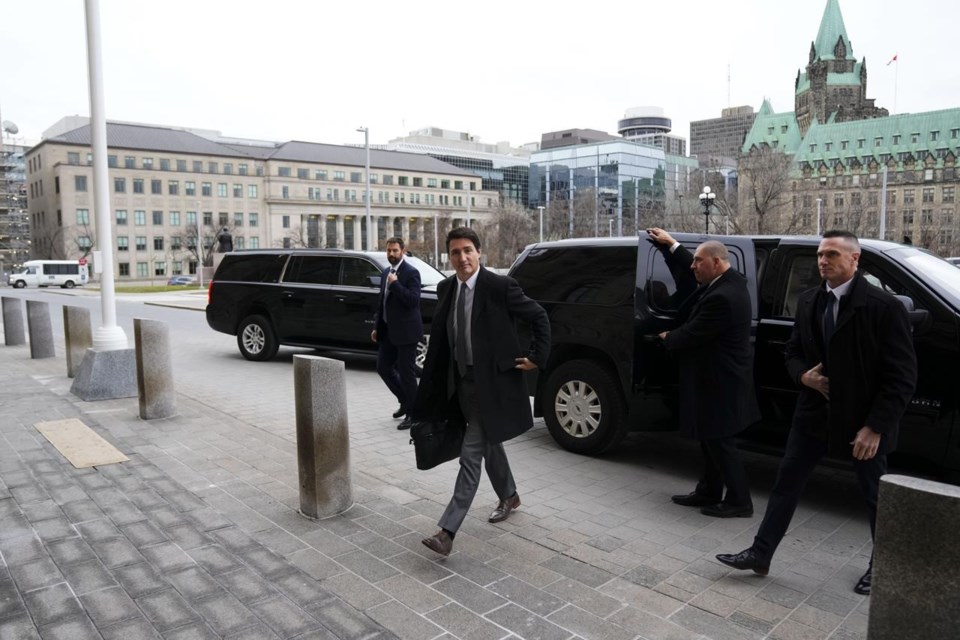OTTAWA — Nothing is off the table when it comes to responding to newly proposed legislation that would give Alberta Premier Danielle Smith's government "exceptional powers," Prime Minister Justin Trudeau said Wednesday.
Trudeau stopped briefly on his way into a Liberal caucus meeting to address the long-awaited legislation Smith's government introduced Tuesday in the provincial legislature.¬Ý
The bill, called the Alberta Sovereignty Within a United Canada Act, proposes to give Smith's cabinet the power to rewrite provincial laws without legislative debate.
Trudeau said his government will be watching closely what happens next.
"I'm not going to take anything off the table," he said.
"I'm also not looking for a fight," he added. "We want to continue to be there to deliver for Albertans."
Smith promised the legislation when she was a candidate in the United Conservative Party leadership race to replace former premier Jason Kenney. She characterized the bill as a way to push back against Ottawa and made it a major focus of her campaign.¬Ý
Frustration with the federal government over equalization payments and resource development has been a long-standing issue in Alberta. Smith is hoping to tap into that frustration with the new bill.¬Ý
But critics say what it really proposes is to consolidate power around Smith's cabinet.¬Ý
Kenney, who waded into the leadership race to call Smith's sovereignty proposal "catastrophically stupid," resigned after she tabled her plan Tuesday.
"We know that the exceptional powers that the premier is choosing to give the Alberta government in bypassing the Alberta legislature is causing a lot of eyebrows to raise in Alberta," Trudeau said Wednesday. "We're going to see how this plays out."
Federal NDP Leader Jagmeet Singh said the federal government should start preparing a possible legal challenge to the bill, calling it not only unconstitutional, but a risk to health-care.¬Ý
Singh expressed concern Smith may use it to "opt-out" of the Canada Health Act in favour of offering people a chance to pay for services.¬Ý
"Let's see the government start taking steps to pre-emptively prepare a legal challenge."
Intergovernmental Affairs Minister Dominic LeBlanc suggested it's too early to begin talk of court battles.¬Ý
"I'm not even sure it's constitutional to challenge a law that hasn't been passed," he said.
Under Smith's bill, cabinet would have the power to direct "provincial entities," from municipalities to regional health authorities, to defy federal rules it deems would hurt Alberta's interests.
Liberal MP Anthony Housefather, who represents a Montreal riding, said the proposal goes too far.¬Ý
"I don't think that this is appropriate for a province to determine whether or not a federal law exceeds its constitutionality. That is for a court," he told reporters.¬Ý
"If Alberta eventually adopts this bill, we'll have to see how they use it."¬Ý
Smith's vision for Alberta has drawn comparisons to Quebec, which administers its own provincial pension plan and immigration programs and ‚Äî in many Albertans' minds, at least ‚Äî appears to garner more jurisdictional respect from Ottawa when it wants to go its own way.¬Ý
Housefather said people should be "wary" to use that analogy.¬Ý
He pointed out that many head offices and residents left Montreal for Toronto when true Quebec sovereignty, meaning the province's formal separation from Canada, was on the table.
"Businesses want stability, I think people want stability, and I don't think the sovereignty act, even if it's called 'the sovereignty act in a united Canada,' offers stability."
Smith has said her proposal is not about separating from Canada. However, on Wednesday, she released a video on Twitter that described her plans not to enforce so-called Liberal laws that "attack" the province's economy and individuals' rights under the Canadian Charter of Rights and Freedoms.
Housefather says the bigger question the bill raises is about "how Canadians see their country" ‚Äî whether they see a role for a federal government beyond their province or territory.¬Ý
"I feel very strongly that as a Canadian, everybody should play in their lane, and playing in their lane means that legislatures don't determine whether something is constitutional from a different level of government," he said.¬Ý
While Smith has said she hopes the bill does not need to be used, briefing materials provided to reporters show her government is prepared to do so as early as next spring to deal with issues ranging from health care to property rights.¬Ý
Conservatives in Ottawa were largely silent on the matter Wednesday, with two Alberta MPs saying they still needed to read the bill.¬Ý
Garnett Genuis, another MP from the province, said the best way to allay Albertans' frustrations with Ottawa is to replace Trudeau.¬Ý
Genuis had more to say about the proposal during the provincial leadership race, when he backed Travis Toews, who is now a member of Smith's cabinet.¬Ý
In an opinion piece published in August he called the prospective sovereignty act a "cheap trick" that violates the constitution and the rule of law.¬Ý
"If asserting provincial authority were as easy as passing such a law, it would have been done already," Genuis wrote.¬Ý
This report by The Canadian Press was first published Nov. 30, 2022.¬Ý
Stephanie Taylor and Mia Rabson, The Canadian Press




